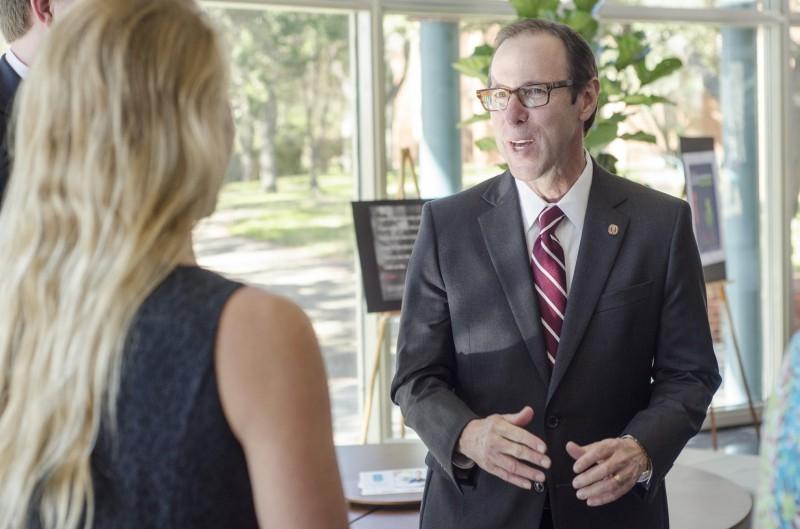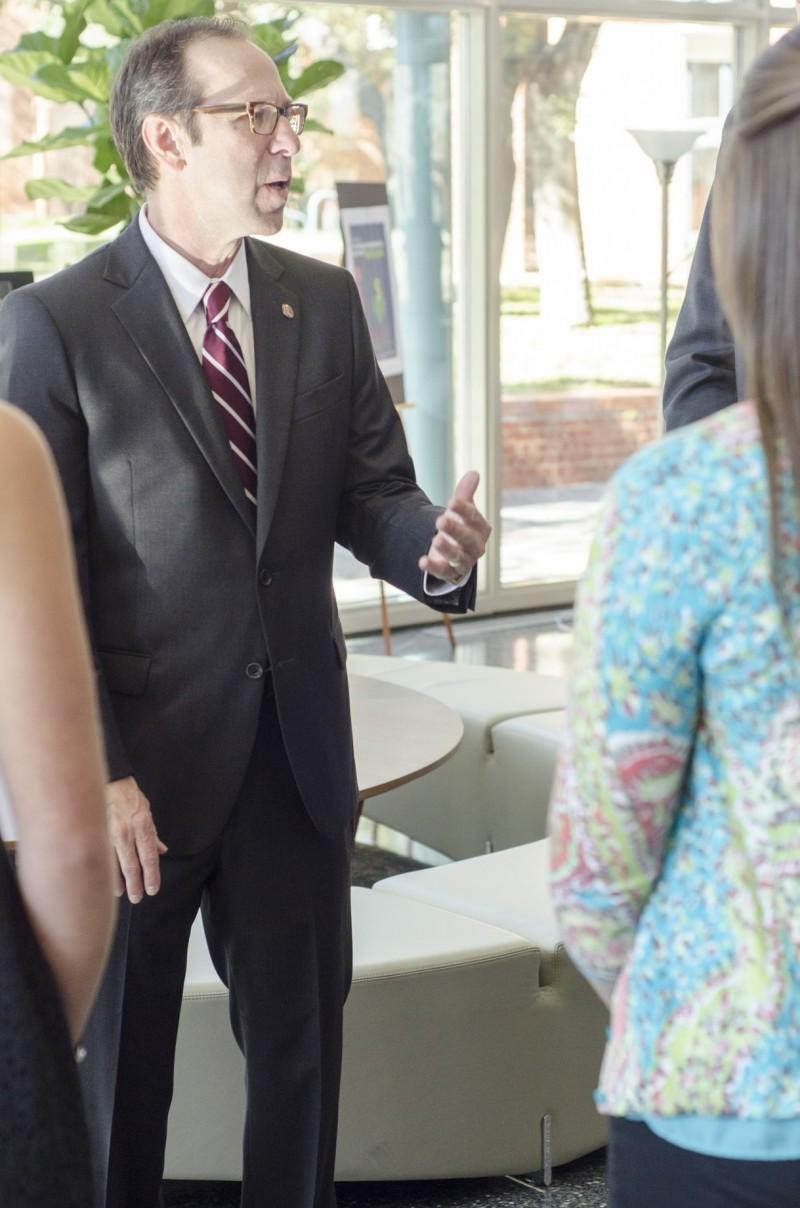On a recent visit to Trinity, president-elect Danny J. Anderson met with students and participated in the San Antonio Martin Luther King, Jr., March. Anderson will assume the presidency on May 29, 2015, becoming Trinity’s 19th president. Anderson is currently the dean of the College of Liberal Arts and Sciences at the University of Kansas and earned his Bachelor of Arts in Spanish from Austin College and master’s and doctorate degrees in Spanish from the University of Kansas. Anderson is a native Texan, born in Houston. He and his wife, Kimberley, are parents of two adult children.
Question: What do you think makes you a good fit for Trinity?
Answer: I think I am a good fit for Trinity because I really admire the values that the university stands for. If you really look at the strategic planning process, there is a statement about key values. Looking at discovery, excellence, growth and I especially like at the end where it talked about the individual and community. It’s very exciting to become part of a place where there are many exciting individuals, but also that sense that as a community, we will be far greater than the sum of our parts. I think that’s what Trinity seeks for its students, and I think it seeks to be that kind of an institution in the city of San Antonio.
Q: What do you hope to accomplish during your time here?
A: There are three key areas that I think are very important. One of them is that the president needs to do everything to ensure that Trinity Tomorrow, the Strategic Plan, becomes a reality. It’s a decade-long plan, but I think [the university] is really positioned to be the strongest and the best that it can be. It’s linked to the second goal, … a real desire to make Trinity more prominent in ways that other individuals outside of the community understand [what] is going on here. And then the third thing coming up, one way to look at it is that Trinity was founded in 1869. We are about to have a 150th birthday. That is a great cause for celebration, but it’s also an opportunity for people to think about the kind of support that we need to accomplish our goals. When you look at many small liberal arts colleges, the question is: how supportive, how engaged are their alumni? And one of my efforts would be definitely to connect with alumni so that they are helping tell our story loudly and proudly.
Q: Do you foresee any challenges in the transition to a smaller university?
A: Whether you are going to another large university or a university of a different size, I think the new president needs to be accepting of the fact that I will learn a new culture. Part of my task will be to tell my stories of what it’s like to come to love Trinity, the same way that many of the students and the faculty and the alumni have come to love Trinity and the difference it’s made for them.
Q: Do you have any particular concerns or worries about the transition?
A: There’s nothing in particular that I am worried about. I am a very open person, so, whatever I encounter, I feel very confident that I have a very supportive community that will help me understand not only what I can do to be successful but also what I can do to help them be successful.
Q: What are you most excited about coming to San Antonio and Trinity as well?
A: The list is long. I loved meeting the students and the faculty. They are phenomenal. Working with individuals who are extremely dedicated to what they are doing, both the faculty and the students, is very exciting. The trustees at the university are remarkable. They are so dedicated to the welfare and the future of this institution. I am sincerely excited by the opportunity to get to know the students as a community. That is very important to me, and it is very appealing being at a student-centric liberal arts and sciences university.
Q: What will the transition be like for you and your wife coming to San Antonio?
A: I think we are looking forward to identifying the ways that we will both connect with the university community, but also San Antonio. I think it’s very important. It’s very important for the university to be connected with the city. The story of how Trinity came to be located in San Antonio and the desire for Trinity to really be an intellectual heart for the city means that I have to be a true representative of the university within the city, so we are looking forward to getting to know people, becoming members of organizations and such.
Q: Do you have any plans on how you’re going to engage on and off campus?
A: Right now I am engaging in conversation with some of the leadership and alumni here at the university to try and figure out what would be some of the ideal first steps that I could take. I am looking forward to developing a very clear plan. One of my philosophies is that it’s very important to have very clear intentions because those are the intentions that you are going to make become a reality.
Q: Looking at the last president, thought to be one of his shortcomings, was president Ahlburg’s fundraising. What do you intend to do in that aspect of the presidency?
A: I love fundraising. I hope that people look at me and think that it is one of things I am very successful at. Trinity is helping tell a story, helping the university engage with its alumni, but also helping present the ways that””with the support of our alumni and our friends””we can do things far greater than people would imagine.
Q: Another thing the university is working on alongside the strategic plan is the new curriculum. Do you foresee any changes in that area and what do you think of that plan?
A: One of the things that I think is really important when you look at a new leader coming in, people often wonder, “Is that person going to come in and change everything?” If you look at other universities that are really successful, it’s when you have individuals who are able to recognize what change is going on and are able to help the group keep momentum going forward on those changes. So rather than anyone expecting me to come in and alter the change that is underway, my goal is to come in and help that change be truly successful.








